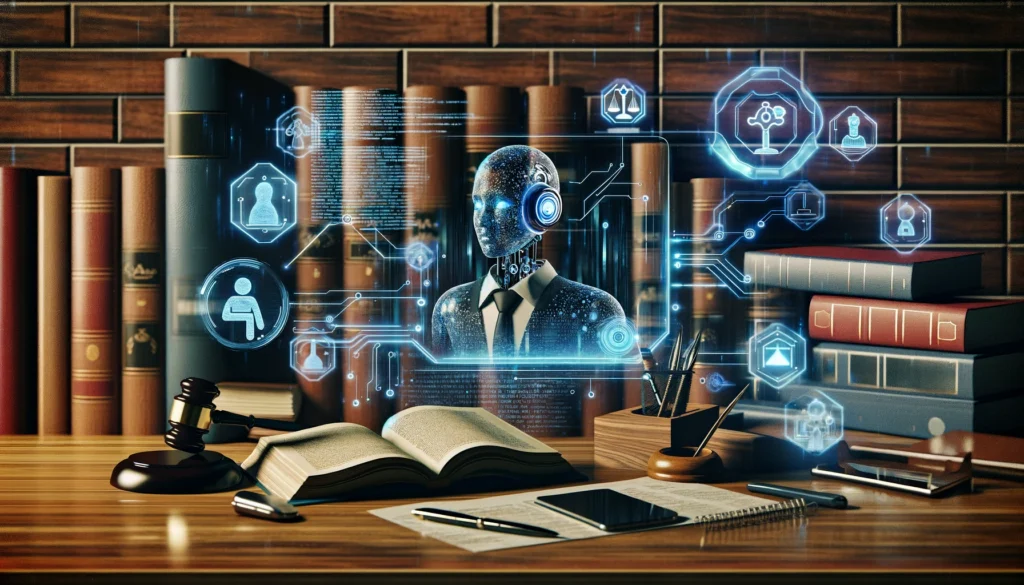
In the ever-evolving landscape of legal practice, paralegals find themselves at the forefront of embracing emerging technologies that can streamline workflows and drive efficiency. One such groundbreaking innovation drawing attention is the advent of large language models (LLMs) like ChatGPT – powerful AI tools poised to revolutionize complex tasks, including the intricate process of will drafting.
Crafting a will demands meticulous attention to detail, adherence to state-specific laws, and a deep understanding of client needs. Paralegals often shoulder the burden of time-consuming tasks like gathering client information, drafting initial documents, and ensuring compliance with legal requirements. However, by leveraging the capabilities of ChatGPT, they can unlock newfound efficiency and accuracy in the will drafting process.
This article unveils the art of crafting effective prompts that harness ChatGPT’s power, empowering paralegals to simplify and accelerate their daily undertakings. Through a curated collection of five prompts, we explore strategies to generate comprehensive client questionnaires, create initial will drafts, refine clauses, proofread documents, and facilitate client review. Mastering these prompts allows paralegals to elevate their practice, streamline workflows, and ultimately deliver a superior level of service.
Unlocking ChatGPT’s full potential hinges on formulating prompts that capture the nuances of will drafting. In the following sections, we dissect each prompt, offering practical guidance and techniques to ensure accuracy, compliance, and clarity throughout the drafting journey – equipping you with the tools to thrive in this AI-driven era.
Understanding the Will Drafting Process
Crafting a legally binding will is a complex endeavor that demands a thorough grasp of various facets. To fully appreciate the value ChatGPT offers, let’s break down the key stages of the will drafting process:
A. Client Information Gathering
- Conducting in-depth interviews to uncover client wishes, family dynamics, asset distribution plans, and specific bequests or instructions
- Ensuring accurate and complete details to avoid ambiguities, omissions, or legal challenges
B. Initial Will Document Drafting
- Adherence to state-specific laws and regulations governing:
- Will validity requirements
- Witness provisions
- Mandatory or restricted clauses
- Precise and unambiguous language to reflect client intentions accurately
- Maintaining legal enforceability of will provisions
C. Review and Collaboration
- Close cooperation with attorneys for guidance on complex matters
- Thorough review of drafts for legal compliance
- Addressing potential issues, conflicts, or areas of concern
Overlooking any of these critical components can render a will vulnerable to challenges or outright invalidity. Paralegals must navigate this intricate process with legal expertise and a deep understanding of clients’ needs.
By breaking down the complexities, the immense potential for ChatGPT to streamline and enhance the will drafting workflow becomes evident. The following prompts serve as a roadmap, guiding you through each stage with precision and efficiency.
First, we’ll explore generating a comprehensive client questionnaire – a crucial first step to gathering the necessary information for a legally sound and client-centric will.
Prompt 1: Client Questionnaire
The foundation of any well-drafted will lies in the meticulous gathering of client information. This critical first step sets the stage for capturing the nuances of the client’s wishes and ensuring the resulting document aligns with their intentions.
The Prompt “Generate a detailed client questionnaire for drafting a will. The questionnaire should cover key sections such as:
- Personal information
- Family details
- Asset inventory
- Specific bequests
- Executor appointment
- Guardianship provisions (if applicable)
- Funeral instructions
- Additional clauses or considerations
Format the questionnaire in a clear and organized manner, with section headings and guiding notes to ensure clients provide complete and accurate information.”
Benefits
- Comprehensive coverage of essential will drafting aspects
- Clear, concise questions guided by natural language processing
- Minimized risk of incomplete or ambiguous client responses
Enhancing Effectiveness
- Customization
- Tailor prompts to include specific state laws, unique client circumstances, or areas of concern.
- Follow-up Prompts
- Gather additional details or clarification on responses requiring elaboration.
- Format Optimization
- Experiment with formats (multiple-choice, open-ended)
- Use section headings, bullet points, numbered lists for improved organization and readability.
By leveraging ChatGPT’s prowess in generating tailored client questionnaires, paralegals ensure they capture all essential information upfront, minimizing follow-ups and reducing errors or omissions in subsequent drafting stages.
With this solid foundation, we transition to the next critical step: using ChatGPT to create an initial draft of the will document, tailored to the client’s needs and compliant with relevant legal requirements.
Prompt 2: Initial Draft Generation
With a comprehensive client questionnaire in hand, the next pivotal step is generating an initial draft of the will document itself. This stage demands precision, attention to detail, and adherence to state-specific legal requirements – a tall order for even the most experienced paralegal.
Enter ChatGPT, a powerful ally in streamlining this intricate process. By crafting an effective prompt, paralegals can leverage the AI’s natural language processing capabilities to create an initial draft that accurately reflects the client’s wishes while ensuring compliance with relevant laws.
The Prompt
“Based on the provided client information [insert details from questionnaire], generate an initial draft of a will that complies with the laws of [specify state]. The draft should include the following sections:
- Introduction and Declaration
- Revocation of Prior Wills
- Appointment of Executor(s)
- Specific Bequests
- Residuary Estate Distribution
- Guardianship Provisions (if applicable)
- Administrative Powers and Duties
- Testamentary Trust Provisions (if applicable)
- General Provisions (e.g., simultaneous death, survivorship requirements)
- Execution Clause
Ensure that the language used is clear, concise, and unambiguous, and that all clauses conform to the relevant state statutes and legal precedents.”
Key Benefits
- Accuracy: By incorporating client information and state-specific requirements, the draft aligns with the client’s intentions and legal mandates.
- Consistency: ChatGPT’s language processing capabilities ensure consistent terminology and phrasing throughout the document.
- Compliance: The AI can reference legal resources and precedents to ensure adherence to relevant statutes and case law.
Enhancing Effectiveness
- Iterative Refinement
- Leverage follow-up prompts to refine specific clauses, address ambiguities, or incorporate additional provisions.
- Customized Formatting
- Experiment with formatting prompts to generate drafts in preferred styles or templates, enhancing consistency and readability.
- Collaboration Integration
- Incorporate feedback from attorneys or senior paralegals into subsequent prompts to iteratively improve the draft.
By harnessing ChatGPT’s power in generating initial will drafts, paralegals can streamline the process, reduce errors, and ensure a solid foundation for further refinement and review, ultimately delivering a comprehensive and legally compliant document tailored to the client’s needs.
With the initial draft in hand, we can proceed to the next stage: leveraging ChatGPT’s capabilities to refine specific clauses or sections, enhancing clarity and addressing potential ambiguities or omissions.
Prompt 3: Clause Refinement
Even with a meticulously crafted initial draft, the intricate nature of will drafting often necessitates refinements to specific clauses or sections. Ambiguities, omissions, or evolving client needs may require revisions to ensure the document accurately reflects their intentions while remaining legally compliant.
In this stage, ChatGPT emerges as a valuable ally, empowering paralegals to refine clauses efficiently and effectively. By leveraging the AI’s natural language processing capabilities, paralegals can explore alternative phrasings, clarify ambiguities, and ensure the utmost precision in the document’s language.
The Prompt
“Refine the following clause from the will draft: [insert clause text]. Provide alternative phrasing options that enhance clarity, address potential ambiguities, or incorporate additional provisions as needed. Ensure that any revisions align with the relevant state laws and legal precedents.”
Key Benefits
- Clarity: ChatGPT can suggest alternative phrasings that eliminate ambiguities and improve the clause’s clarity.
- Completeness: The AI can identify potential omissions or oversights and propose additions to ensure comprehensive coverage.
- Legal Compliance: By referencing legal resources, ChatGPT can ensure any refinements adhere to relevant statutes and case law.
Enhancing Effectiveness
- Contextual Prompts
- Incorporate relevant client information or background details to guide ChatGPT’s refinement suggestions, ensuring alignment with the client’s specific needs and circumstances.
- Comparative Analysis
- Request ChatGPT to provide a comparative analysis of alternative phrasings, highlighting the pros and cons of each option to facilitate informed decision-making.
- Collaborative Iteration
- Engage in an iterative process with ChatGPT, refining the clause through multiple rounds of prompts until the desired clarity and precision are achieved.
By leveraging ChatGPT’s prowess in clause refinement, paralegals can ensure that every section of the will draft accurately reflects the client’s intentions, eliminates ambiguities, and remains compliant with legal requirements. This iterative process not only enhances the document’s quality but also streamlines the workflow, reducing the need for extensive manual revisions.
With a refined and polished draft in hand, the next critical step is to leverage ChatGPT’s capabilities in proofreading and fact-checking, ensuring the utmost accuracy and consistency throughout the document.
Prompt 4: Proofreading and Fact-Checking
Even the most meticulously drafted wills can harbor subtle errors, inconsistencies, or factual inaccuracies that can undermine their legal validity. Thorough proofreading and fact-checking are essential steps in the will drafting process, ensuring that the final document is free from errors and reflects the client’s intentions with utmost precision.
In this stage, ChatGPT emerges as a powerful ally, offering its natural language processing capabilities to aid paralegals in proofreading and fact-checking the will draft with unparalleled efficiency and accuracy.
The Prompt “Proofread and fact-check the attached will draft. Identify any grammatical errors, spelling mistakes, inconsistencies in terminology or phrasing, or factual inaccuracies. Cross-reference the draft against relevant legal resources, client information, and state-specific requirements to ensure complete accuracy and compliance.”
Key Benefits
- Precision: ChatGPT’s language processing capabilities enable it to identify even the most subtle errors or inconsistencies, ensuring a polished and error-free document.
- Thoroughness: By cross-referencing against legal resources, client information, and state laws, ChatGPT can verify the accuracy of facts and ensure compliance with relevant requirements.
- Efficiency: Leveraging AI’s proofreading and fact-checking capabilities streamlines the process, saving paralegals significant time and effort.
Enhancing Effectiveness
- Prioritized Review
- Prioritize specific sections or clauses for ChatGPT’s review based on their complexity or importance, ensuring a focused and efficient approach.
- Customized Fact-Checking
- Provide ChatGPT with additional resources or reference materials relevant to the client’s specific circumstances, enabling more comprehensive fact-checking.
- Collaborative Refinement
- Engage in an iterative process, incorporating ChatGPT’s findings and suggestions into subsequent drafts, ensuring a continuous cycle of improvement.
By harnessing ChatGPT’s proofreading and fact-checking capabilities, paralegals can ensure that the final will draft is polished, accurate, and fully compliant with legal requirements. This meticulous attention to detail not only enhances the document’s quality but also mitigates the risk of potential legal challenges or disputes arising from errors or inaccuracies.
With a thoroughly proofread and fact-checked draft in hand, the next step is to leverage ChatGPT’s capabilities in facilitating client review and feedback, ensuring that the final document accurately reflects the client’s wishes and intentions.
Prompt 5: Client Review and Feedback
As the will drafting process nears completion, ensuring that the final document accurately reflects the client’s wishes and intentions becomes paramount. Facilitating a comprehensive client review and gathering feedback is a critical step in this journey, enabling paralegals to identify and address any remaining ambiguities or misalignments before finalizing the will.
In this stage, ChatGPT emerges as a valuable ally, empowering paralegals to generate clear and concise summaries that facilitate client understanding and streamline the feedback process.
The Prompt “Based on the attached will draft, generate a plain language summary that clearly explains the key provisions and their implications to the client. Highlight any specific bequests, trust arrangements, guardianship provisions, or other notable clauses in a manner that is easily understandable by a layperson. The summary should be organized in a logical, easy-to-follow structure to aid the client’s comprehension and enable them to provide informed feedback.”
Key Benefits
- Clarity: ChatGPT’s natural language processing capabilities allow it to translate complex legal terminology into plain language, enhancing client understanding.
- Comprehensive Coverage: The AI can ensure that all key provisions and implications are thoroughly addressed in the summary, minimizing the risk of overlooking critical details.
- Structured Communication: By organizing the summary in a logical and easy-to-follow format, ChatGPT facilitates effective communication and feedback gathering from the client.
Enhancing Effectiveness
- Tailored Summaries
- Customize the prompt to generate summaries tailored to the client’s specific circumstances, such as unique family dynamics, business interests, or complex asset distributions.
- Iterative Refinement
- Leverage client feedback to refine the summary through subsequent prompts, ensuring that all concerns and clarifications are addressed before finalizing the will.
- Collaborative Review
- Incorporate insights and guidance from attorneys or senior paralegals in crafting the summary, ensuring comprehensive coverage and alignment with best practices.
By leveraging ChatGPT’s capabilities in generating clear and concise summaries, paralegals can facilitate a seamless client review process. This approach not only enhances client understanding but also streamlines the feedback loop, enabling efficient incorporation of any necessary revisions or adjustments before finalizing the will.
With the client’s feedback and approval in hand, the will drafting process reaches its zenith, culminating in a legally compliant and client-centric document that safeguards the client’s wishes and intentions for the future.
Elevating the Will Drafting Process
The legal landscape’s evolution demands continuous pursuit of efficiency and innovation in will drafting. Harnessing ChatGPT revolutionizes workflows, streamlining the intricate process of crafting legally compliant, client-centric wills.
Leveraging prompts simplifies each stage – from generating client questionnaires to drafting, refining clauses, proofreading, and facilitating client review. ChatGPT emerges as a versatile ally, minimizing errors while enabling exceptional service.
However, AI complements human expertise, not replaces it. Vigilant oversight ensures outputs align with laws, precedents, and unique client needs. Collaborative human-AI symbiosis unlocks full potential.
As AI boundaries expand, paralegals must embrace growth mindsets, explore new prompts, techniques, and use cases. Sharing best practices fosters continuous learning, collectively harnessing AI to drive innovation and superior client outcomes.
Those embracing legal expertise’s intersection with technological innovation will emerge as leaders, setting new standards for efficiency, accuracy, and client satisfaction. Elevate your practice by embracing AI’s future.


